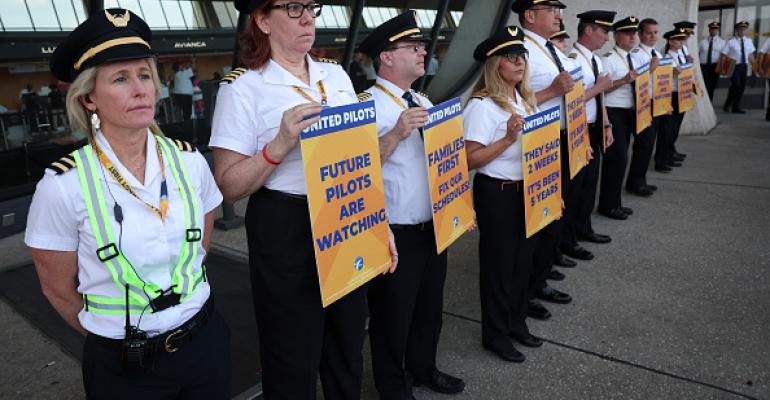Recent news that pilots at American, Southwest, and United airlines are threatening to strike might be fraying the nerves of meeting professionals concerned about their upcoming events. Here’s a wrap-up of the latest news on airline pilot contracts, and some perspective on the possibility of a strike.
Delta Airlines: On March 1, Delta pilots, represented by the Air Line Pilots Association, ratified a new four-year contract that includes $7 billion in cumulative increases in pay and benefits, including better company contributions to 401(k) plans and improved work rules. The deal set a new benchmark for pilot compensation and has likely urged on pilots at other U.S. airlines.
American Airlines: On May 1, American pilots voted to authorize a strike for the first time in more than 25 years. A strike authorization does not mean a strike is imminent but gives the union authority to strike if contract negotiations fall through.
Southwest Airlines: On May 11, Southwest’s pilots approved authorization of a strike.
United Airlines: Pilots at the airline have not voted on whether to authorize a strike, but about 2,000 of United’s 14,000 pilots picketed last week at 10 airports across the country to underline their concerns over pay and benefits.
While a pilot walkout at American, Southwest, or United could play havoc with travel to meetings and events, here are three reasons why planners can rest easy, at least in the near term.
1. American CEO Robert Isom has said on the record that the carrier is prepared to match the deal that Delta negotiated with its pilots. If that happens, pressure on other airlines to follow suit will increase.
2. Under U.S. law, airline and railroad workers can’t legally strike unless a federal mediation board determines that further negotiations will be ineffective. Congress and the president can also act to prevent a strike: When 9,300 American pilots walked off the job in 1997, President Bill Clinton responded with an emergency 60-day suspension of the strike and created a board to oversee a resolution.
3. Pilot strikes are rare. The last U.S. airline pilots strike was in 2010, when some 440 Spirit Airlines pilots stopped flying on June 12. A week later, negotiations were completed and the airline was back in business.
MORE FROM MEETINGSNET:
Event Insurance for Storm Season: What to Know





